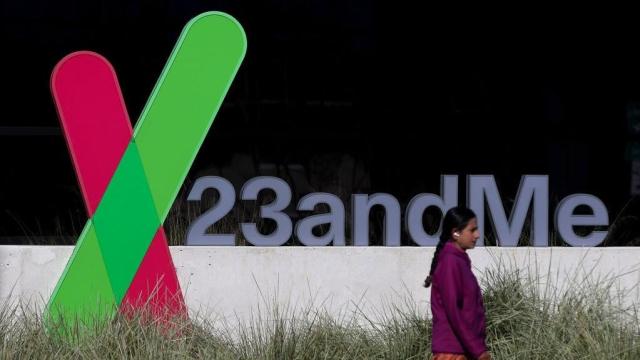23andMe is in a death spiral. Almost everyone who wants a DNA test already bought one, a nightmare data breach ruined the company’s reputation, and 23andMe’s stock is so close to worthless it might get kicked off the Nasdaq. CEO Anne Wojcicki is on a crisis tour, promising investors the company isn’t going out of business because she has a new plan: 23andMe is going to double down on mining your DNA data and selling it to pharmaceutical companies.
“We now have the ability to mine the dataset for ourselves, as well as to partner with other groups,” Wojcicki said in an interview with Wired. “It’s a real resource that we could apply to a number of different organizations for their own drug discovery.”
That’s been part of the plan since day one, but now it looks like it’s going to happen on a much larger scale. 23andMe has always coerced its customers into giving the company consent to share their DNA for “research,” a friendlier way of saying “giving it to pharmaceutical companies.” The company enjoyed an exclusive partnership with pharmaceutical giant GlaxoSmithKline, but apparently the drug maker already sucked the value out of your DNA, and that deal is running out. Now, 23andMe is looking for new companies who want to take a look at your genes.
Wired asked Wojcicki if her customers are aware that opting in to research also means opting in to giving pharmaceutical partners their data. Wojcicki didn’t answer that question directly. “It’s not individual-level data, unless they explicitly consented for individual-level data,” she said. “I think that most people want to see improvements in their lives,” and the company’s multimillion-dollar deals are necessary for those improvements.
According to Wojcicki, the most exciting opportunity for “improvements” is that 23andMe and the pharmaceutical industry get to develop new drugs. There’s a tinge of irony here. Any discoveries that 23andMe makes come from studying DNA samples that you paid the company to collect. With that gift, 23andMe hopes to develop a second thing that you also get the privilege of paying for. And now, thanks to 23andMe’s exciting new subscription services, there’s even a third opportunity to shell out your hard-earned cash.
The problem with 23andMe’s consumer-facing business is the company sells a product you only need once in a lifetime. Worse, the appeal of a DNA test for most people is the novelty of ancestry results, but if your brother already paid for a test, you already know the answers.
23andMe knows that’s an issue, so it’s spent years trying to brand itself as a healthcare service, and not just a $US79 permission slip to tell people you’re Irish. In fact, the company thinks you should buy yourself a recurring annual subscription to something called 23andMe+ Total Health. It only costs $US1,188 a year. Or, if you don’t care that much about your health, you can opt for the cheaper 23andMe+ Premium, which is just $US298 upfront, plus a subscription that renews at $US69.
The secret is you just can’t learn a ton about your health from genetic screenings, aside from tests for specific diseases that doctors rarely order unless you have a family history. What 23andMe is selling you is a promise: someday in the future, genetic tests will be able to tell us more, and when 23andMe unlocks the secrets of the human genome, its health services will be valuable to you.
What do you get with these subscriptions? It’s kind of vague. Depending on the package, they include a service that “helps you understand how genetics and lifestyle can impact your likelihood of developing certain conditions,” testing for rare genetic conditions, enhanced ancestry features, and more. Essentially, they’ll run genetic tests that you may not need. Then, they may or may not recommend that you talk to a doctor, because they can’t offer you actual medical care.
You could also skip the middleman and start with a normal conversation with your doctor, who will order genetic tests if you need them and bill your insurance company—but that’s a lot less fun than paying a tech company hundreds or thousands of dollars.
And that might happen! But it’s only going to happen if 23andMe has the cash to unlock secrets from your DNA, which is both a long shot and an extremely expensive project. Wojcicki told Wired she’s “optimistic,” and she’s saved the company from the brink of death before, but it looks like a steeper climb from here on out.
If 23andMe company survives, the first step is going to be deals that give more companies access to look at your genetics than ever before. But if 23andMe goes out of business, it’ll get purchased or sold off for parts, which means other companies will get a look at your data anyway.
